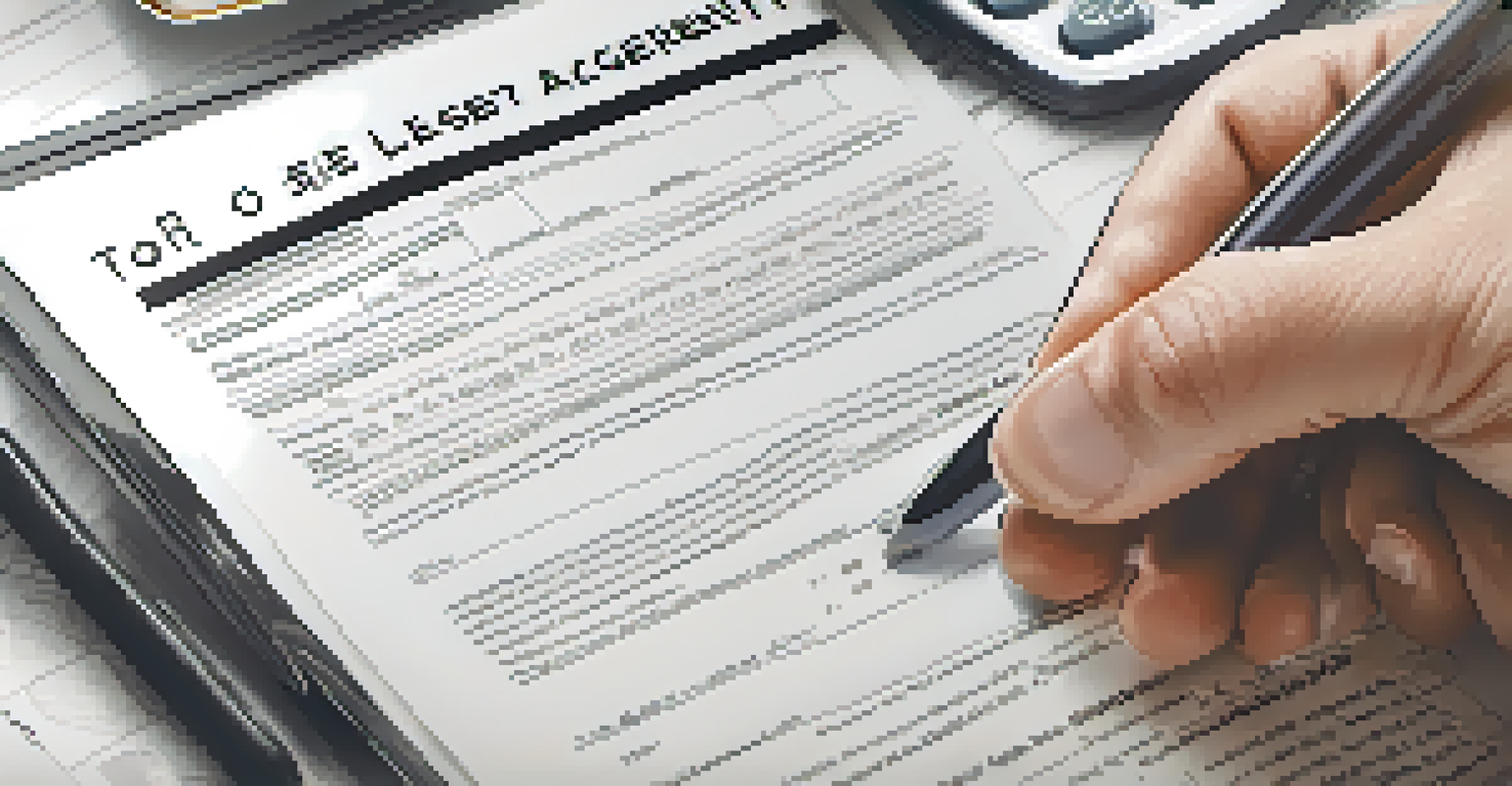Understanding the Pros and Cons of Rent-to-Own Options

What is Rent-to-Own and How Does It Work?
Rent-to-own is a unique real estate arrangement where tenants can eventually buy the home they are renting. Typically, a portion of the monthly rent is credited towards the purchase price, giving renters a path to homeownership. This model can be particularly appealing for those who may not have enough savings for a traditional down payment.
Homeownership is a cornerstone of wealth building in America.
In a rent-to-own agreement, the renter usually signs a lease with an option to buy the property at a predetermined price within a specific timeframe. This option can provide renters with the opportunity to test out the home and neighborhood before making a long-term commitment. It's a win-win situation for both parties if executed correctly.
However, potential buyers must be diligent in reviewing the terms of any rent-to-own contract. Not all agreements are created equal, and understanding the fine print is crucial to avoid pitfalls down the line.
Pros: Building Equity While Renting
One of the most significant advantages of rent-to-own is that renters can build equity while living in the property. Unlike traditional renting where monthly payments go to the landlord, a portion of rent in a rent-to-own agreement contributes to the future purchase. This can make the idea of homeownership feel more tangible and achievable.

Moreover, this arrangement allows individuals to lock in a purchase price, potentially saving them money if property values increase. For example, if the market appreciates during the rental period, the future buyer stands to gain from the increased value without having initially bought the property.
Rent-to-Own Offers Homeownership Path
This arrangement allows renters to build equity and eventually purchase the home they are renting.
Additionally, rent-to-own options can be more accessible for those with less-than-perfect credit. It provides an opportunity for individuals to improve their credit score while simultaneously working towards homeownership, enabling a smoother transition into buying a home.
Cons: Potential Financial Pitfalls
While rent-to-own agreements have their benefits, they also come with potential financial downsides. If renters decide not to purchase the home at the end of the lease, they may lose all the money they've invested in rent credits. This can be a significant financial blow, especially if they were counting on becoming homeowners.
The best time to buy a home is always five years ago.
Another concern is that the initial purchase price may not be as favorable as it seems. If the market declines, renters could end up paying more than the current market value for the home. This highlights the importance of researching local real estate trends before entering into a rent-to-own agreement.
Additionally, maintenance and repair responsibilities can vary in rent-to-own scenarios. If the contract requires renters to handle repairs, they could face unexpected expenses that add to their financial burden, complicating their path to ownership.
Flexibility: A Key Benefit of Rent-to-Own
One of the appealing aspects of rent-to-own contracts is their flexibility. These agreements often allow for negotiation on terms that suit both parties, such as the purchase price, rental duration, and responsibilities for maintenance. This flexibility can create a more personalized experience for potential homeowners.
Renters can also use the rental period to determine if the home truly meets their needs. It’s a chance to see if the property feels like home without the immediate pressure of making a purchase. This trial period can be invaluable for families or individuals who may be uncertain about their long-term plans.
Flexibility in Terms and Conditions
Rent-to-own agreements can be tailored to meet the needs of both parties, providing a personalized experience.
Moreover, this arrangement can provide renters with the stability of a home while they navigate their finances. Knowing they have the option to buy can reduce stress and allow them to focus on other important life decisions, such as career changes or family planning.
Market Variability: Risks in a Changing Economy
The real estate market is notoriously unpredictable, which can pose risks for rent-to-own agreements. Economic downturns or shifts in the housing market can affect property values, potentially leaving renters in a tough spot if they’ve committed to a purchase price. Understanding these market dynamics is crucial for anyone considering a rent-to-own option.
Renters should also be aware of the potential for changes in interest rates over time. If rates rise significantly before they purchase the home, their mortgage costs could be much higher than anticipated. This could impact their ability to secure financing and ultimately afford the home they’ve been renting.
Additionally, local economic conditions such as job growth and population trends can influence property values. Conducting thorough research on the area’s future prospects is essential to making an informed decision when entering a rent-to-own agreement.
Legal Considerations: Know Your Rights
Entering into a rent-to-own agreement requires a solid understanding of legal implications. Renters must ensure that the contract is clearly written and outlines all roles and responsibilities. It’s advisable to consult with a real estate attorney or professional to review the contract before signing.
Pay attention to important details like the duration of the lease, the exact terms of the purchase option, and any penalties for non-compliance. These elements can significantly impact the renter's rights and obligations throughout the rental period.
Market Risks Impacting Purchases
Economic fluctuations can affect property values, making it crucial for renters to understand market dynamics before committing.
Additionally, understanding the local laws surrounding rent-to-own agreements is crucial. Different states may have varying regulations that can affect how these contracts are enforced, making it essential to stay informed and protected.
Weighing Your Options: The Right Path for You
Ultimately, whether a rent-to-own option is right for you depends on your personal circumstances and long-term goals. It's essential to weigh the pros and cons carefully and consider your current financial situation. If you're unsure about committing to a mortgage, a rent-to-own agreement could be a suitable stepping stone.
However, if you have a stable financial foundation and are ready for homeownership, traditional purchasing may be a better fit. It’s important to evaluate all available options, including the potential risks associated with rent-to-own agreements.

In the end, taking the time to research, seek advice, and understand your options will lead to a more informed decision. Whether you choose rent-to-own or traditional buying, ensuring it aligns with your financial goals is key to a successful transition to homeownership.